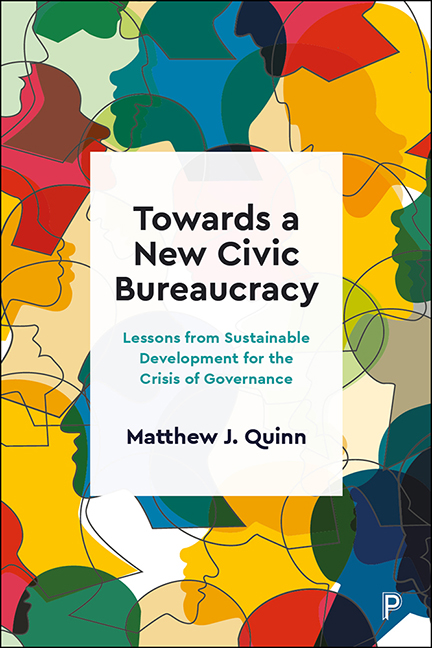Book contents
- Frontmatter
- Dedication
- Contents
- List of figures and tables
- Introduction
- 1 Framing the thinking
- 2 Governance and sustainable development as governmentality
- 3 Bureaucratic practice and governmentality
- 4 Lessons from governing for sustainable development
- 5 A new civic bureaucracy
- Closing words
- Appendices
- References
- Index
Closing words
Published online by Cambridge University Press: 15 September 2022
- Frontmatter
- Dedication
- Contents
- List of figures and tables
- Introduction
- 1 Framing the thinking
- 2 Governance and sustainable development as governmentality
- 3 Bureaucratic practice and governmentality
- 4 Lessons from governing for sustainable development
- 5 A new civic bureaucracy
- Closing words
- Appendices
- References
- Index
Summary
A republic – if you can keep it.
Benjamin FranklinThe Brundtland Report called in the late 1980s for a radical new global ethic of sustainable development. This aim has been constrained and coopted by practice and values drawn from very different views of the way the world and life should work, and it is under challenge from bleak views of society and of civics.
The persistence of existing bureaucratic norms and practices constitute a hidden factor in unsustainability, reinforcing wider political and social norms of governance. By recognizing this, we can begin to scope a new purpose and accompanying processes for public administration. These processes can embed an enabling, systemic and reflexive approach. Much of the basis for this can be found in new approaches being pursued in response to the challenge of reshaping governance to address unsustainability at multiple levels of governance. This practice can find further focus by applying a civic republican approach to change which sees a new basis for governance as non-domination, with dialogue and civic responsibility at its heart.
This book has focused on the role of public bureaucracy. Bureaucracy matters because it shapes what is possible in governance relations and what counts as success. Its repetitive practice and specific disciplines are central to constraining possibilities across the whole system. Foucault's concept of governmentality embraces the notion of power being established in the interplay of relationships. Bureaucracy is a key (and potentially most readily reformable) element in this complex interplay of actors and networks in governance.
Changing bureaucracy is a necessary if not sufficient condition for meaningful change. The cases considered in this book indicate where the interplay of societal expectations, of representative democracy and of market capitalism, serve to limit the scope for reform and reassert traditional narratives. Invoking the spirit of the Brundtland introduction, a new bureaucratic agenda is not a purely technocratic one. It must also be part of, and foster, a societal and political discussion about the purpose of governing and the nature of a just and inclusive democracy in this new century. This includes the perennial question of what government should do, but now posed from a different viewpoint.
- Type
- Chapter
- Information
- Towards a New Civic BureaucracyLessons from Sustainable Development for the Crisis of Governance, pp. 123 - 124Publisher: Bristol University PressPrint publication year: 2022



